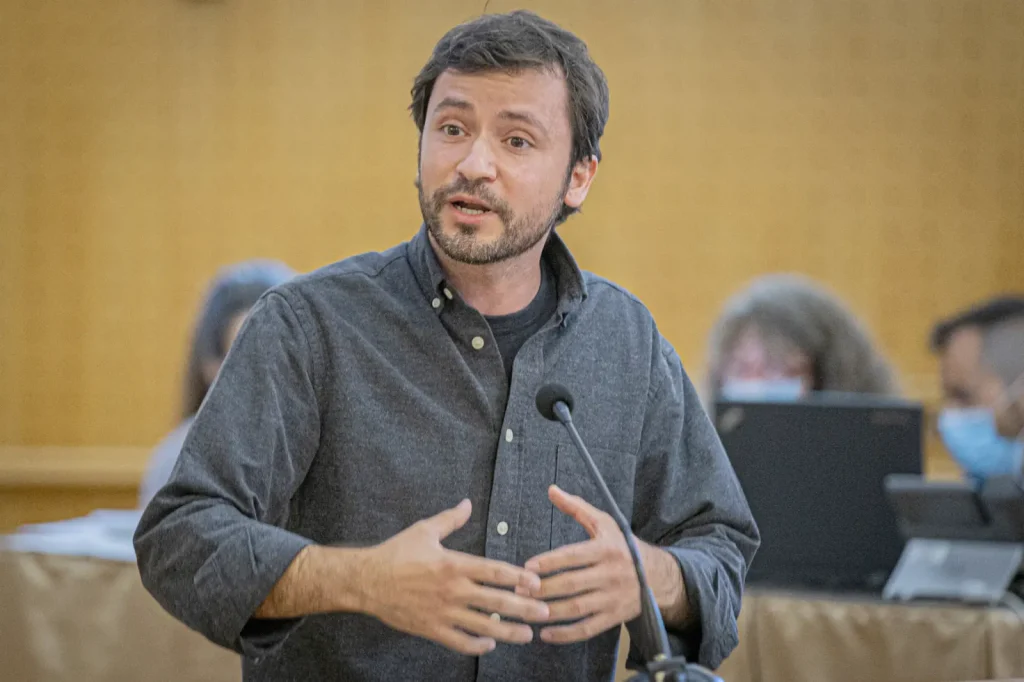
Josè Soeiro
Portugal for Universidade do Porto and associação Tartaruga Falante
Overview
Title of the Intervention : Students by Loans (Estudantes por Empréstimo)
When it was implemented? For how long? : 2008 -2011
Numbers of participants: Approximately 50 performances held at universities and high schools across Portugal. Attendance ranged from 15 to 200 students per session, depending on local organization and the mobilization efforts of student associations.
Where we are: Portugal
Aim/Goal of the action – Main theme of the Legislative Proposal to Propose/Support
To address police dFoster public debate and raise awareness and collective action on democratic access to higher education, scholarship systems, and the financialization of education. Structured discussions on public policies related to:
Simplifying bureaucratic procedures for accessing scholarshipsiscrimination against LGBT and gender non-conforming individuals.
The social support and scholarship system.
The new model of bank loans for students.
Target
University and high school students
Describe each steps of the initiative
Group creation
Performance creation
Performances and questionnaire: After each session, participants completed a questionnaire to identify the legislative changes they considered most urgent. The collected proposals were published on a weblog, which was popular at the time, to ensure transparency and continued engagement.
Parliament and petition: At the end of the academic year, participants were invited to a special session at the Parliament, where:
– Ten legislative proposals, developed by a team of students, lawyers, activists, and the parliamentary project team, were presented.
– Participants voted on the three priority proposals.
– A petition was launched to gather signatures in support of the proposals, involving students directly in the signature collection process. Thanks to the support of thousands of signatures, the proposals were formally submitted to Parliament.
Reflections and Methodology
Overview
Title of the Intervention : Caring Every Day
Entity that promoted the initiative: Laboratórios de Teatro e Política (Laboratory of Theatre and Politics), which included several members from the original Students by Loans project.
When it was implemented? For how long? : Initiated around 2021 or 2022
Numbers of participants: The play was performed around 15 times in diverse settings
Where we are: Portugal
Aim/Goal of the action – Main theme of the Legislative Proposal to Propose/Support
To establish a national care system in Portugal.
Focus on unpaid social care, the narrative explores struggles to:
- Secure financial and social support.
- Access professional caregiving services.
- Rely on help from friends and family.
The play highlighted systemic issues in caregiving, such as the lack of paid leave, insufficient public policies, and over-reliance on unpaid family carers.
Which level of change the entity want to reach?
National level
Public position of the proposing entity:
– What was the public position of the proposing entity, and its relationship with the community?
A new group whose aim was to address social and political challenges through forum theatre, using the methodology of the Theatre of the Oppressed.
– What was its stance on the subject of the intervention?
To have a national care system in Portugal that would:
- Distribute caregiving responsibilities between families and the state.
- Provide a network of professional caregiving services nationwide.
- Recognize the rights of unpaid carers through legislative frameworks.
What is the connection to the decision makers? Which power the entity has?
One of the organizer is a Member of Parliament
Target
Caregivers
Internal Allies
A coalition of 12 organizations—including informal carers, feminist groups, and disability advocates.
External Allies
The project engaged diverse stakeholders, including:
- Informal carers.
- Professional care workers.
- Representatives from government and social security.
- Advocacy groups for elderly, disabled, and migrant populations.
- International experts, such as a United Nations consultant and a representative from Uruguay
Describe each steps of the initiative
Formation of the New Group. The new group was founded by: Joana Cruz, Amadio Felizes, and myself, all alumni of Students by Loans. Inês Barbosa, who brought experience from a theatre group based in Braga. The group initially included 25 members who met weekly.
Creation of the play “Caring Every Day”, tackled the theme of informal caregiving.
Performances: The play was performed around 15 times in diverse settings:
- Rural communities: Performed in four villages to reach underserved populations.
- Urban centers: Presented in Porto multiple times.
- Parliamentary settings: Featured during International Informal Care Day on November 5, 2022, where it was performed in the Senate Room of the Portuguese Parliament.
- Specialized events: Presented at national care conferences, university events, and time bank gatherings.
Each performance included a forum theatre session, where audiences were invited to propose and act out solutions to caregiving challenges. The play and discussions also served as platforms for gathering signatures for the Right to Care initiative, which required 25,000 signatures for submission to Parliament.
Submission to Parliament.
Reflections and Methodology
Resources and Contacts
Contact person: Josè Soeiro
Other interesting things: The Need for Long-Term Action: Beyond producing laws, efforts should aim to sustain civil society’s engagement and political momentum. Legislative theatre and activism should focus on systemic change and collective empowerment.
